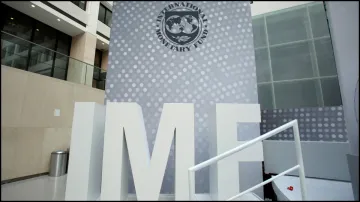IMF approves disbursal of $1.1 billion loan tranche to cash-strapped Pakistan
The latest tranche is the third and final part of the $3 billion 'stand-by' arrangement between Pakistan and the IMF which is crucial for the country to counter the rising inflation and debt. The cash-strapped country is reeling under high inflation and debt and is heavily reliant on such packages.

Washington: The International Monetary Fund (IMF) has finally approved the immediate disbursement of the $1.1 billion loan tranche to cash-strapped Pakistan, marking the conclusion of the second economic bailout package, Dawn reported. This is the third and final instalment of the $3 billion 'stand-by' arrangement reached between Pakistan and then global moneylender last year.
The IMF reached a staff-level agreement with cash-strapped Pakistan for the release of a $1.1 billion tranche last month, noting that Pakistan's inflation was above target and economic growth remained modest. An IMF team, led by Nathan Porter, visited Islamabad from March 14-19 to hold discussions on the second review of Pakistan’s economic programme supported by an IMF. The third loan tranche was crucial for Pakistan to stave off a sovereign default, particularly as the existing arrangement is set to expire this month.
The IMF executive board met in Washington on Monday and completed the second review under the arrangement. All board members favoured releasing the last instalment except India, which abstained. “The completion of the second and final review reflects the authorities’ stronger policy efforts under the SBA, which have supported the stabilisation of the economy and the return of modest growth,” the IMF said in a statement.
What did the IMF say about Pakistan?
The IMF said Pakistani authorities need to continue their policy and reform efforts, including strict adherence to fiscal targets, to move the country from stabilisation to a strong and sustainable recovery. It also emphasised the need for a "market-determined exchange rate to absorb external shocks" and broadening of structural reforms to support stronger and inclusive growth.
IMF's Deputy Managing Director Antoinette Sayeh said that owing to Pakistan's policy efforts under the stand-by arrangement have resulted in the return of moderate growth and the decline in inflation. "Given the significant challenges ahead, Pakistan should capitalize on this hard‑won stability, persevering—beyond the current arrangement—with sound macroeconomic policies and structural reforms to create stronger, inclusive, and sustainable growth. Continued external support will also be critical," he added.
Pakistan is eyeing a new, more substantial IMF loan over a longer duration in the future. Finance Minister Muhammad Aurangzeb has indicated that Islamabad could secure a staff-level agreement on the new program as early as July. The focus is on securing a loan spanning at least three years to bolster macroeconomic stability and implement much-needed structural reforms. However, the exact scale of the program remains undisclosed.
Real success in getting rid of debt: Shehbaz Sharif
Pakistan Prime Minister Shehbaz Sharif on Tuesday said that the "real success" lies in getting rid of debt and not securing another loan tranche, while expressing satisfaction over the approval of the third tranche by the Washington-based lender, reported Geo News. Lauding the financial team, including Finance Minister Muhammad Aurangzeb for their efforts, the prime minister said that the $1.1 billion tranche will "bring more economic stability".
Shehbaz further said the government made bitter and tough decisions concerning the economy, adding that such decisions are now proving themselves beneficial in the form of improved and stabilised economic indicators. Pakistan has made a formal request to the IMF for seeking the next bailout package ranging between $6 to $8 billion under the Extended Fund Facility (EFF) with the possibility of augmentation through climate financing.
Economic problems in Pakistan
Pakistan continues to be enmeshed in an economic crisis with inflation remaining high and economic growth slowing to around 2 per cent. Meanwhile, the total debt burden on Pakistan has risen to a whopping 63,399 trillion Pakistani Rupees (PKR) ($12.2 billion) by the end of November last year in the financial year 2023-24, according to a local report.
The inflation in Pakistan has reached its highest point in nearly 50 years - soaring as high as 38 per cent. Food inflation has surged to 48 per cent, reaching its peak in 2016. The government's decision to devalue the currency by over 50 per cent within a year and eliminate subsidies has also exacerbated the cost-of-living crisis.
Like many developing nations, Pakistan is confronted with the daunting task of addressing poverty, inequality, and social disparities exacerbated by the aforementioned inflation and rising debt. Pakistan's total debt increased by over PKR 12.430 trillion during the tenure of the PDM and the caretaker government. The overall debt burden surged to PKR 63.390 trillion including PKR 40.956 trillion in domestic loans and PKR 22.434 trillion in international loans. This was believed to be a result of Pakistan's economic development being limited to the elite.
(with inputs from ANI)
ALSO READ | India aiming to be 'superpower', we are 'begging' to avoid bankruptcy: Pakistani leader